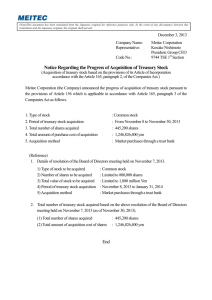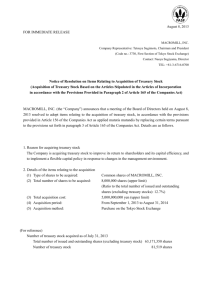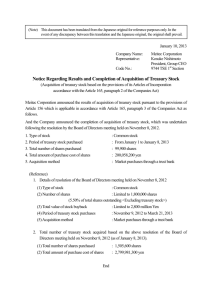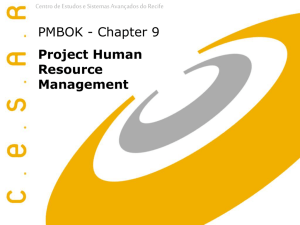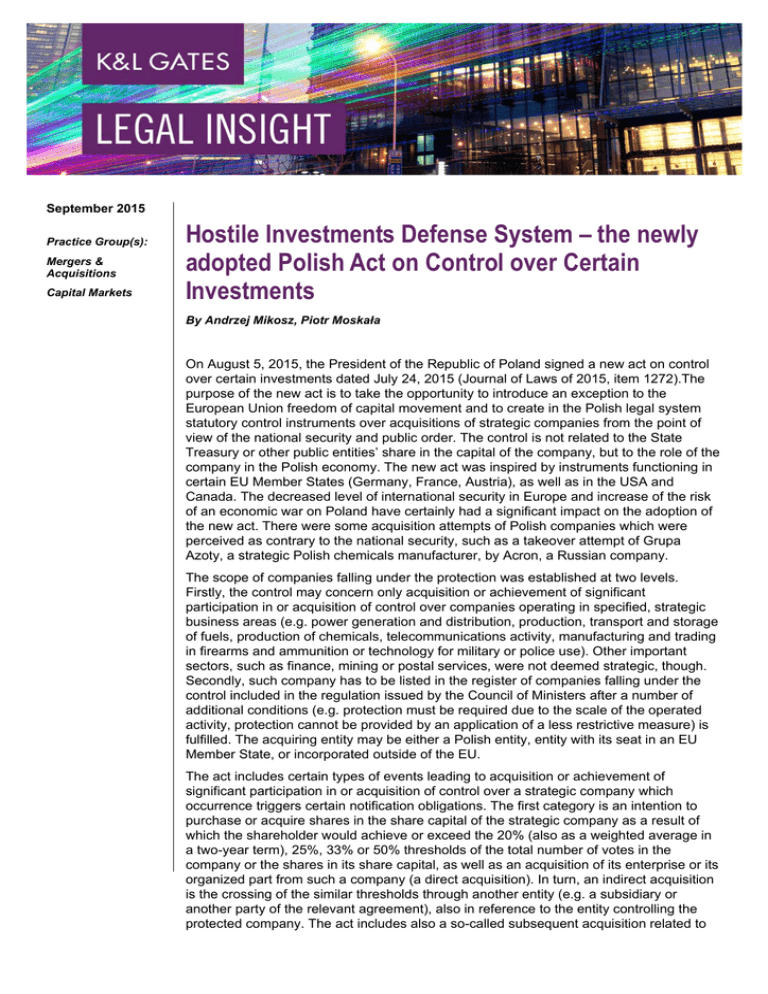
September 2015
Practice Group(s):
Mergers &
Acquisitions
Capital Markets
Hostile Investments Defense System – the newly
adopted Polish Act on Control over Certain
Investments
By Andrzej Mikosz, Piotr Moskała
On August 5, 2015, the President of the Republic of Poland signed a new act on control
over certain investments dated July 24, 2015 (Journal of Laws of 2015, item 1272).The
purpose of the new act is to take the opportunity to introduce an exception to the
European Union freedom of capital movement and to create in the Polish legal system
statutory control instruments over acquisitions of strategic companies from the point of
view of the national security and public order. The control is not related to the State
Treasury or other public entities’ share in the capital of the company, but to the role of the
company in the Polish economy. The new act was inspired by instruments functioning in
certain EU Member States (Germany, France, Austria), as well as in the USA and
Canada. The decreased level of international security in Europe and increase of the risk
of an economic war on Poland have certainly had a significant impact on the adoption of
the new act. There were some acquisition attempts of Polish companies which were
perceived as contrary to the national security, such as a takeover attempt of Grupa
Azoty, a strategic Polish chemicals manufacturer, by Acron, a Russian company.
The scope of companies falling under the protection was established at two levels.
Firstly, the control may concern only acquisition or achievement of significant
participation in or acquisition of control over companies operating in specified, strategic
business areas (e.g. power generation and distribution, production, transport and storage
of fuels, production of chemicals, telecommunications activity, manufacturing and trading
in firearms and ammunition or technology for military or police use). Other important
sectors, such as finance, mining or postal services, were not deemed strategic, though.
Secondly, such company has to be listed in the register of companies falling under the
control included in the regulation issued by the Council of Ministers after a number of
additional conditions (e.g. protection must be required due to the scale of the operated
activity, protection cannot be provided by an application of a less restrictive measure) is
fulfilled. The acquiring entity may be either a Polish entity, entity with its seat in an EU
Member State, or incorporated outside of the EU.
The act includes certain types of events leading to acquisition or achievement of
significant participation in or acquisition of control over a strategic company which
occurrence triggers certain notification obligations. The first category is an intention to
purchase or acquire shares in the share capital of the strategic company as a result of
which the shareholder would achieve or exceed the 20% (also as a weighted average in
a two-year term), 25%, 33% or 50% thresholds of the total number of votes in the
company or the shares in its share capital, as well as an acquisition of its enterprise or its
organized part from such a company (a direct acquisition). In turn, an indirect acquisition
is the crossing of the similar thresholds through another entity (e.g. a subsidiary or
another party of the relevant agreement), also in reference to the entity controlling the
protected company. The act includes also a so-called subsequent acquisition related to
Hostile Investments Defense System – the newly adopted Polish Act on
Control over Certain Investments
the crossing of the abovementioned thresholds, inter alia, by the redemption of shares of
the protected company, acquisition of own shares by the protected company, or by the
merger or demerger of such a company.
If the above circumstances occur, then the Minister of the State Treasury must be notified
about the acquisition or the achievement of significant participation or acquisition of
control, to which the Ministry of the State Treasury has the right to object in case it
threatens, inter alia, independence of the Republic of Poland, integrity of its territory,
respect of the freedoms and rights of persons and citizens, national security and pubic
order. The state’s economic interest cannot constitute a basis for the decision of the
Ministry of the State Treasury. Proceedings in this regard, in some cases, may also be
initiated ex officio. An objection may be expressed in the form of administrative decision
issued within 90 days of the date of the notification. The decision may be appealed
against by submitting a request for reconsideration of the matter and, in case of a
subsequent negative decision, by a complaint to the Provincial Administrative Court.
Acquisition or achievement of significant participation or acquisition of control without
notification or against an objection of the Ministry of the State Treasury is invalid. In
certain cases such actions may remain valid, yet the acquiring entity will not be able to
exercise rights from shares acquired in the protected company, except from the right to
sell them. The Ministry of the State Treasury may in such case impose a term for the sale
of shares in the protected company and, if the sale is not made, may appoint an
administrator for this purpose.
The act constitutes another link in the state surveillance system over companies of
strategic importance. It complements the provisions of, inter alia, the Act of March 18,
2010 on the special powers of the minister competent for the matters of the State
Treasury and their execution in certain capital companies or capital groups operating in
the electricity, petroleum and gas sectors (Journal of Laws of 2010, No. 65, item 404), on
the basis of which the Minister of the State Treasury may object to the actions of the
corporate bodies of the company that negatively affect the continuity of service and
integrity of the so-called critical infrastructure.
The new regulation may be deemed controversial as far as its compliance with EU
legislation and the decisions of the Court of Justice of the EU, relating mostly to the socalled golden share. It may be significant that the authority competent to issue a decision
on objection to the acquisition or achievement of significant participation in or the
acquisition of control over the protected company is the Minister of the State Treasury,
which also exercises the rights from shares owned by the State Treasury. Despite the
fact that an objection cannot be based on the state’s economic interest, the concentration
of both functions in one administrative authority makes their transparent separation
difficult and may lead to a conflict of interest.
The act may potentially also complicate transformations performed within the capital
group of a company entered in the register included in the regulation of the Council of the
Ministers, due to the lack of an exemption for an acquisition or achievement of a
significant participation or acquisition of control by an entity from the same group. This
problem regards both the transfer of shares within the group (by way of their purchase,
as well as their contribution to the company) and mergers or demergers involving other
members of the group.
The new act will come into force on October 1, 2015.
2
Hostile Investments Defense System – the newly adopted Polish Act on
Control over Certain Investments
Authors:
Andrzej Mikosz
andrzej.mikosz@klgates.com
+48.22.653.4218
Piotr Moskała
piotr.moskala@klgates.com
+48.22.653.4305
Anchorage Austin Beijing Berlin Boston Brisbane Brussels Charleston Charlotte Chicago Dallas Doha Dubai Fort Worth Frankfurt
Harrisburg Hong Kong Houston London Los Angeles Melbourne Miami Milan Moscow Newark New York Orange County Palo Alto
Paris Perth Pittsburgh Portland Raleigh Research Triangle Park San Francisco São Paulo Seattle Seoul Shanghai Singapore
Spokane Sydney Taipei Tokyo Warsaw Washington, D.C. Wilmington
K&L Gates comprises more than 2,000 lawyers globally who practice in fully integrated offices located on five
continents. The firm represents leading multinational corporations, growth and middle-market companies,
capital markets participants and entrepreneurs in every major industry group as well as public sector entities,
educational institutions, philanthropic organizations and individuals. For more information about K&L Gates or
its locations, practices and registrations, visit www.klgates.com.
This publication is for informational purposes and does not contain or convey legal advice. The information herein should not be used or relied upon
in regard to any particular facts or circumstances without first consulting a lawyer.
© 2015 K&L Gates LLP. All Rights Reserved.
3


